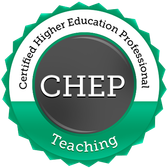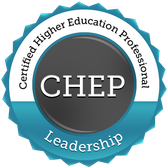Badge Evidence | Completed Courses (4 Hours Each)
EC115Integrating Career Readiness Into Your Courses: Part I
This course will provide an overview of career readiness including information and activities that may be incorporated into your courses. This course, which forms Part I of a two-part series, provides details about four specific career readiness skills: critical thinking/problem solving, verbal/written communications, teamwork/collaboration, and information technology applications. Additional thoughts and resources will also be provided to allow you to consider multiple ways to assist students in developing these skills in your courses.
EC140Introduction to Positive Psychology for Educators
Positive psychology is the science of human flourishing and is leveraged to cultivate well-being for students, teachers, and staff in schools around the world. You'll be introduced to the tools of positive psychology to help you and your students thrive in the classroom and in life. This course is designed to help you understand the science of well-being and how to employ it for yourself and in educational settings to support well-being and academic achievement. The modules cover positive psychology's origins, and the research and application of the PERMA model, Character Strengths, and positive education.
ED101Effective Teaching Strategies
This introductory course covers the essential roles of a teacher and the competencies required to be a successful instructor in an educational institution. Proven techniques and strategies for planning and preparation are presented and discussed. In addition, the course offers effective methods for conducting the first class meeting and delivering course content. This course provides a solid foundation for new instructors and serves as an excellent refresher for more experienced instructors.
ED102Student Retention Methods
The instructor is the real key to student retention at any educational institution. Instructors must keep focused on student motivation and retention each and every day of class. Developing strategies for retaining students throughout the entire training sequence is both complex and rewarding. All instructors should have the goal of seeing all of their students successfully complete their class. This course helps you reach that goal by helping you to understand your students and use proven motivation and retention techniques to keep them enrolled and engaged in the learning process.
ED108Learning Theory and Practice
This course covers the different ways individuals learn and apply new knowledge. We start by covering the steps the brain goes through as it processes new information, and how knowledge is stored and retrieved. We then discuss how intelligence is measured and how learners process information through the use of multiple intelligences. Moving from theory to practice, the course shows instructors how to use the learning needs of students to increase knowledge acquisition and retention. The course includes a number of easy to implement strategies to help students retain and use new content.
ED113Managing the Adult Classroom
This course compares and contrasts four styles of classroom management. The course includes "virtual visits" to animated classrooms where participants observe four instructors who exhibit different management styles. The style that is preferred by most students is identified and described, and suggestions are offered on how instructors can modify their personal style to increase their effectiveness. A four-step model for developing successful classroom management strategies is presented and is followed by a discussion of a practical, behavioral approach to classroom management. Characteristics that foster good discipline in the educational institution and in the classroom are listed and explained, and tips are offered that can improve both institution-wide and classroom discipline. Finally, a number of scenarios involving common discipline problems are described.
ED116Critical Thinking Processes and Applications
The majority of careers require the ability to think critically and problem solve at one level or another. Employers seek individuals who can think independently, propose solutions, and solve problems. The content in this course provides the foundation for critical thinking and demonstrates how people with different interests, abilities, and aptitudes approach problem solving. The course covers the different kinds of intelligence and how they impact critical thinking, for a broader understanding of how people process solutions to problems. It concludes with step-by-step instructions for helping students develop and refine their own critical thinking skills.
ED123Adaptive Learning in Education
This course will provide you with a basic overview of the background and history of an innovative instructional method called Adaptive Learning (AL). AL is growing in popularity and differs from traditional educational methods as it focuses on individualized, personalized instruction for everyone. With the rise of technology, AL has a definite place in education. This course discusses the background, importance, issues, attitude changes, implementation and future of AL. The advantages outweigh any disadvantages as AL can help create individualized instruction and increase student success.
ED138Competency-Based Instruction
The term "Competency-Based Instruction" (CBI) is emerging as a new and preferred approach to education and the management of education. CBI is currently being evaluated at all levels of education, from K-12 to higher education and beyond. In traditional higher education it is referred to as CBE (Competency-Based Education) as it relates to specific competency-based programs. This course explores the topic in terms of the various characteristics of competency-based teaching and learning and highlights the most commonly agreed-upon benefits for students. The course also addresses the teaching approaches required to support a competency-based learning environment most effectively.
ED140Five Myth-Understandings about Learning and the Brain
Did you ever hear that we only use about 10% of our brains? Were you ever told that you are more right-brained or left-brained? Did you know that males and females learn differently as a result of differences in their brains? Did you know that people have different learning styles? Did you ever hear that you retain more of what you do or see than of what you read or hear? If you answered "yes" to any of these questions, you have experienced a "myth-understanding." The purpose of this course is to explain the background and truth about these myth-understandings that pervade much of the popular literature to this day. All persons who are involved in the education of others must guard against these myths and ensure that they do not influence their professional practices.
Note: Many learning theories have been developed that represent the efforts of researchers with different perspectives on how individuals develop and learn. As within any field, facts and myths may be driven by controversial opinions and philosophies that need to be considered by individuals engaged in professional development.
ED406Motivating Others
Motivation can be the difference between success and failure. In this course, the idea of how motivation impacts people will be discussed. Activities will focus on improving motivation in students, and other people you interact with, as well as yourself. The goal of this course is to help develop a better understanding of the topic, and produce tangible resources to help implement plans, strategies, and ideas at your institution. In addition to lecture videos, resource links, and assessments, you will be able to utilize Learning Activities, which will continue to be useful after successful completion of the course.
ED409Gamification in the Classroom
This course will explore the field of gamification and the way that gaming and gaming elements have come to impact our everyday lives, and can improve our courses. Focusing on easy-to-implement concepts, this course will help you to begin utilizing gamification elements to increase learner engagement and motivation, and increase overall student success.
The goal of this course is to help develop a better understanding of the topic and produce tangible resources to help implement plans, strategies, and ideas at your school. In addition to lecture videos, possible resource links, and assessments, you will be able to utilize the Journal and Learning Activities.
LS101RDo You Manage Or Lead?
This course explores the critical differences between management and leadership. Participants will be introduced to definitions and myths about each area as well as how management and leadership must coexist for an organization to operate effectively. Participants will explore their own management/leadership tendencies through exercises to see leadership and management in action.
LS102How Do You Lead?
Not everyone is suited for, or desires, a leadership position. One of the first steps to being an effective leader is to understand the desire to lead in the first place. Participants will explore their motivation to lead and develop a deeper understanding of their leader style(s).
LS103RYour Leadership Impact
To improve your impact and effectiveness as a leader, you must not only understand the role of a leader, but you must also take into consideration the followers and the situation. This course defines leadership impact and explores the interactional framework for leadership.
LS104RYour Leadership Legacy
The higher education industry provides a wealth of opportunities and challenges for those seeking leadership positions. In this course, participants will gain a deeper understanding of the higher education sector and themselves. The importance of higher education institutions will be explored along with developing a personal leadership legacy.
LS105RYour Leadership Toolkit
Get ready to add a number of skills to your toolkit as you develop as a leader! This course focuses on increased self-awareness in communication styles and learning; developing deeper understanding through empathic listening; and motivating through innovation.
LS106This Way to Leadership
This course provides you with a framework to put your self-discovery and learning into a workable plan to further develop your leadership skills. A step-by-step process is offered to help you create a meaningful Personal Leadership Development Plan (PLDP) complete with the development of SMART Goals and advice from some of today's leaders in the higher education sector.
ML116Writing Skills
Skillful writing helps you accomplish your business objectives and extends your influence as a manager. In this course, you will learn to create clearer, more effective written communications. The course includes specific guidelines for preparing memos, letters, emails, and other common business documents.
ML117Presentation Skills
This course provides sound advice on preparing and delivering presentations that command attention, persuade, and inspire. It includes rehearsal techniques as well as tips for creating and using more effective visuals. The course also addresses the importance of understanding your objectives and your audience to create a presentation with impact.
ML118Coaching Skills
In this course, you will learn how to strengthen your coaching skills by using a four-step process to facilitate the professional growth of the employees you coach.
ML120Feedback Skills
Feedback is an essential component of the communication process. In this course, you will learn when and how to give effective positive or corrective feedback, how to offer feedback upward, and how to receive feedback.
ML122Difficult Interactions
This course will show you how to discuss and resolve difficult interactions in the workplace - whether with employees, peers, bosses, or even suppliers and customers.
ML136Stress Management
In this course, you will learn the difference between positive stress that enhances productivity and negative stress that breeds tension, lowers productivity, and undercuts job satisfaction. The course includes strategies for dealing with underlying causes of worry and stress, with tactical advice and coping mechanisms for immediate problem management.
ML138Crisis Management
In this course, you will learn a practical, hands-on method for looking at crises. The course will show you how to develop a crises audit to avoid and prepare for crises, how to manage an actual crisis, and how to learn from past events.

















































